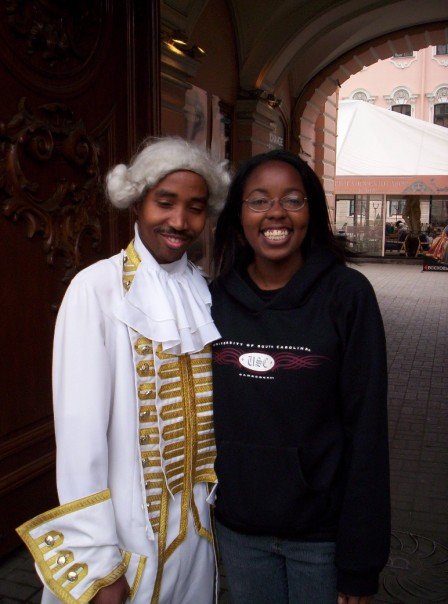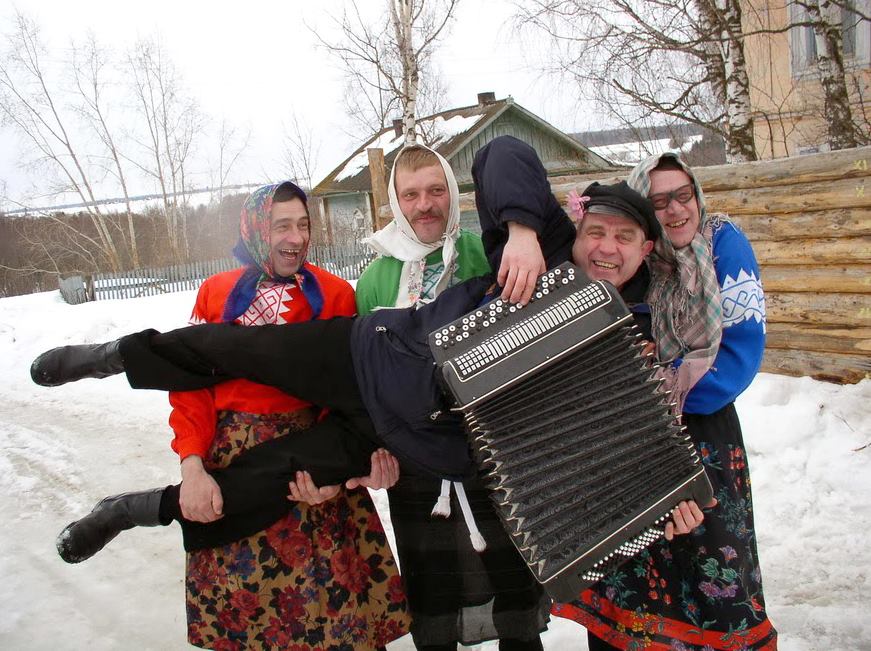Some of our students report not feeling culture shock at all. Some are surprised by how much culture shock they experience. Often, those most affected are those who did not expect it. So how can you prepare to live in a new culture and get the most out of the experience? How do you prepare to return home and for the reverse culture shock that can entail? This guide will try to show you how.
- What is Culture Shock?
- What are the Stages of Culture Shock?
- Why Might I Experience Culture Shock in SRAS Locations?
- What Can I Do about My Culture Shock?
- What is Reverse Culture Shock?
- How to Cope with Reverse Culture Shock
1. What is Culture Shock?

SRAS locations are very foreign environments for most of our students. You can expect your overall stress level to naturally be a little higher due to the fact your regular support group, and usual way of life, will be replaced by something quite different. You will likely find that lots of little things you used to take for granted, such as doing laundry or being able to run to the store for something like a new towel, are more difficult. You don’t know the city or your environment and often asking people for help is harder because of the language barrier. When something goes wrong the people you would usually call to vent about it are suddenly much further away and in a time zone where people are sleeping while you are abroad feeling stress.
Because your stress level is higher, your emotions will be intensified. Your anger will be angrier and your happiness will be happier. You might find that you get angry, stressed, or annoyed much more quickly than you would otherwise. It’s okay! As you learn about your new environment and make new routines, life gets easier.
This brief guide will help you to understand what to expect. You should also know that the site you are on is designed to help you overcome many difficulties and help you feel more at home (from finding a new towel to finding a church to attend). Also, as an SRAS student, you should always feel free to contact us via the telephone numbers or emails provided in the orientation guide we will send you as part of your pre-program orientation. We can usually point you in the right direction to whatever you need.
2. What are the Stages of Culture Shock?

-
Honeymoon Phase. You may experience feelings of euphoria and excitement, making delightful discoveries about your new environment, such as with foods, music, and customs. You are happy and everything is wonderful.
-
Negotiation Phase. Some of the cultural differences you’ve noticed may start to annoy you, perhaps even intensely. You feel homesick, crave certain foods that are hard to find where you are (peanut butter, Mexican food, American-style pancakes, Dorritos, Kellogg-brand cereals, and much more can be hard to find in most of our locations). You experience mood swings and/or feel melancholy. You may even start to hate the host culture.
-
Adjustment Phase. You begin to see the balance between the good and bad differences you see. You develop new routines and a new support network. Your way of life may be drastically different than how it is at home, but you’ve adapted to your new setting and are feeling more like yourself again. Sometimes this stage can take months to reach – but it is generally good for you; you will emerge stronger and more creative than before. Hang in there.
3. Why Might I Experience Culture Shock in SRAS Locations?

From these and other reported experiences, we can say that some of the following may cause you some culture shock:
-
Language Environment. You may suddenly feel like a small child who is incapable of making others understand what you want, and – worse yet – you may feel others are treating you as a child. You will not understand every conversation you have and hear. Even if you are an intermediate or advanced speaker it will take you some time to get used to the new language environment, the rich vocabulary and the modern speech rate. Even if you have been to your host country before, be prepared to experience some anxiety and stress while you readjust to having all forms of communication in a foreign language.
-
Different Norms. You may find you have difficulty relaxing at first in public, since you may not know how to react in certain situations or are surprised to how people react to you in certain situations. Is it appropriate to smile and thank the cashier? Is it normal to be pushed over by a woman who’s trying to get out of the metro car? Why did the store clerk get annoyed with me when I tried to hand her the money rather than place it on the tray? Don’t worry – this phase passes fairly quickly; you will learn by experience. Our best advice is to overcome the temptation to avoid interacting with people and accept the experiences as just another part of your education abroad.
-
Social Isolation. You may suddenly feel disconnected from everyone you know, and left out of the events going on at home. Most of us are used to checking email and social-networking pages several times a day, while this is often not possible in all SRAS locations. While you may not be concerned about this before you head abroad, be prepared for the stress this can cause once on the ground. You will likely go through social media addiction withdrawl (seriously). You may also have difficulty making friends with locals. This does not mean you are a failure at making friends or that the locals don’t like you – it is usually related to the language barrier or that people in major cities like Moscow and St. Petersburg often live very busy lives. This doesn’t mean you shouldn’t try to be social – you certainly should, but it’s best to keep expectations for relationships realistic.
-
Lower Standard of Living. You may be surprised by the condition of your dorm or home stay apartment. Most residential buildings in SRAS locations are old and most rooms are smaller than Americans expect. It may well have been 50 years since the last redecoration or remodeling. The furniture might be old and fragile. You will need to physically light the stove and oven. The toilet might look like small and cheap and, in the dorms, may not have a seat. If you are going to live in a dorm, don’t be surprised if you have one or more roommates to share a space smaller than you are used to having to yourself. Most people adjust to these things within the first few days – but it’s best to be prepared ahead of time.
-
Apparent Rudeness/Coldness. People do not typically smile in greeting, nor do you often see people walking down the street with a big grin. In Slavic culture, the smile is used most often as a reaction to something funny or pleasant or an earned sign of friendship. Smiling for the sake of smiling can be considered a sign of insincerity or even of mental imbalance. People in service industries (waiters and waitresses, post-office clerks, store and vending clerks, etc) may treat you as though you are imposition to them rather than the ultimate source of their paycheck.
-
How to Succeed in Culture Shock Behavioral Norms. Local cultures in SRAS locations tend to be more abrupt, blunt, straightforward, and even aggressive than what you may be used to – verbally and physically. Some of this is big-city culture, similar to what you might find in New York. You may be asked about your financial means. You may have your political and religious beliefs questioned outright. You may hear stereotypes about your culture – some of our students have heard such things as “Americans are like children” and “Americans have no sense of real history.” Try not to get offended – generally such statements are made without the speaker realizing the logical fallacy of generalization they are making (same as when Americans speak generally of Russians). Treat such statements as conversation starters and reply openly, calmly, and confidently. You will begin to form relationships with locals as you begin show them that you are not stereotype, but a multi-faceted, real person.
Do not be surprised if locals feel they have the right to tell you what to do, particularly older individuals. Your host mother may claim you must wear a hat – and she may force it upon your head if you resist. A stranger on the street may tell you not to sit in that spot because it is “dirty” or because you will lose your fertility or for some other reason. These people believe that they are being helpful and we encourage you to take these things in stride. Know that such behavior is particularly common in older women; the Russian babushka is at once a loved, respected, and often feared cultural institution. Again, consider any encounter with such institutions as part of your education abroad.
People in SRAS locations, especially in larger cities can also be more physically aggressive. For instance, it is not uncommon to push strangers out of the way or to sit or stand so close that you are touching a stranger in public transportation (and sometimes impossible not to do both at rush hour).
-
Soviet Images and Symbols. Symbols of Communism are everywhere in Russia and most Russians see no need to change that. For Russians, these symbols are more than symbols of repressions and Gulags, they are symbols of a time when their country was a world power – when they achieved remarkable things in science and space, won military vicitories, and made remarkable social advancements in healthcare, education, and industry. Russians don’t intend to forget the USSR existed, and most will tell you that there were good and bad things that happened in that country.
-
Clothes and the Body. You might notice that most locals in SRAS locations tend to dress up as opposed to down. Guys heading to class commonly wear suits, sweaters, tucked in shirts, and dress shoes. Women are often in skirts and heels. It is considered rude and strange to head to class in sweats. Appearances are important, particularly to younger individuals. Overweight people are also rarer; Slavic females can seem impossibly thin (due to different food cultures; Slavic food portions tend to be small, but high in fat and therefore still filling). Piercings are less prevalent than in the US. You may get stared at if you have visible body art. Some students report feeling self-conscious in such environments. Every student will have to decide for themselves how to handle this. Talk to friends, locals, or your SRAS representative if you are uncomfortable.
4. What Can I Do About My Culture Shock?

Know that you will likely experience some stress, that your feelings may be intensified, and that you will be in awkward, unfamiliar situations on a fairly regular basis. This understanding will help you a lot in adapting to the new culture. Everything you are feeling and experiencing is normal. This stress, part of being in a completely new place, is the source of the personal growth that many people seek when they choose to study abroad. You will emerge from this experience a stronger, more experienced and creative person, and you should be proud of yourself for choosing to put yourself through it!
The following are some ways of coping with culture shock that our students have found helpful:
-
Talking to other students on the program – they are going through the same experiences!
-
Occasionally engaging in an activity you find comforting – playing solitaire, watching a silly movie, listening to music, etc.
-
Exercise – go for a run in the park or take a slow stroll through the city. Also make sure that you come prepared to take care of your health in general. Healthy people are generally happier and more confident than unhealthy people.
-
Keeping a blog or a journal. This is also a great way to document and revisit what you are experiencing, helping you learn even more from it.
-
Making lists and setting goals. Things can seem incredibly overwhelming – but if you keep a log of things to do, things to ask (your teacher, your friends, your SRAS consultant), and goals to accomplish (learn five new verbs, go shopping, etc.), it gives structure and order to the day and helps you prioritize what you really need to do.
- Celebrate your small successes. You should feel proud of yourself when you meet your goals, however seemingly small. You are achieving things.
- Contact SRAS with any questions you may have. We’ve all been through the experiencing of being abroad the first time and we all have alot of experience abroad. We can help you get pointed in the right direction to get to where you want to be.
5. What is Reverse Culture Shock?
Most international travelers are familiar with the symptoms and effects of culture shock: irritation, fatigue, lack of focus, mood swings, and homesickness. Returning home after having spent a significant period abroad can also cause culture shock.

Another reason we experience reverse culture shock is because we return home as different people. We are what we have experienced; it all becomes part of us. Your friends’ and family’s lives have continued just as yours has; they have their own stories to tell, inside jokes, and important moments that you may not be able to relate to. Likewise, despite the fact that you will probably be asked about it all the time, your friends and family may not be able to fully relate to what you have experienced abroad.
Many students will also return home seeing the world differently, with new interests and questions and insights. Studies* have shown that students who study abroad, regardless of program duration, exhibit a significant increase in cultural competency compared to their on-campus counterparts. This is in large part because students returning from study abroad suddenly, and often for the first time in their lives, have something to really compare their homes to. With this new cultural sensitivity, it is easier to look at things we once took for granted with a critical eye. Perhaps all the smiling shop clerks will suddenly seem annoyingly insincere. Perhaps you’ll feel overwhelmed in the grocery store and even guilty for America’s higher standard of living. You’ll likely react to international news stories differently and perhaps really notice many things about your home for the first time.

Thankfully, the relational discomfort is a fairly temporary state. Once you and your family and friends spend more time together following your study abroad experience, bonds begin to grow again as you have more shared experiences and they begin to get to know the you that changed after your experience abroad. Remember to reach out to your support network, follow the tips below, and know that you will adjust.
For more information, take a look at this article the US State Department wrote for Foreign Service Agents coming home from abroad.
6. How to Cope with Reverse Culture Shock
- Be prepared – just knowing your return home may have some difficulties will help.
- Be patient with yourself and others.
- Connect with others who have studied abroad.
- Express your feelings—discuss, write, paint, dance, or whatever helps you to put what’s in your mind into something that exists outside of you.
- Continue engaging your study abroad experience—keep in touch with those you met, maintain your language skills, revisit your photographs and reread your blog/journal.
- Be a peer mentor—help other students prepare for their time abroad and their return home.
- Read more on reverse culture shock to understand it better:
- Re-entry Shock by the Evergreen State University
- Reverse Culture Shock by the University of California, Davis
- Study Abroad Re-entry Handbook by University of Minnesota
- When You Return (video) by Webster University
Citations
*Chieffo, L. & Griffiths, L. (2003). What’s a month worth? Student perceptions of what they learned abroad. International Education, 12(4), 26-31.



